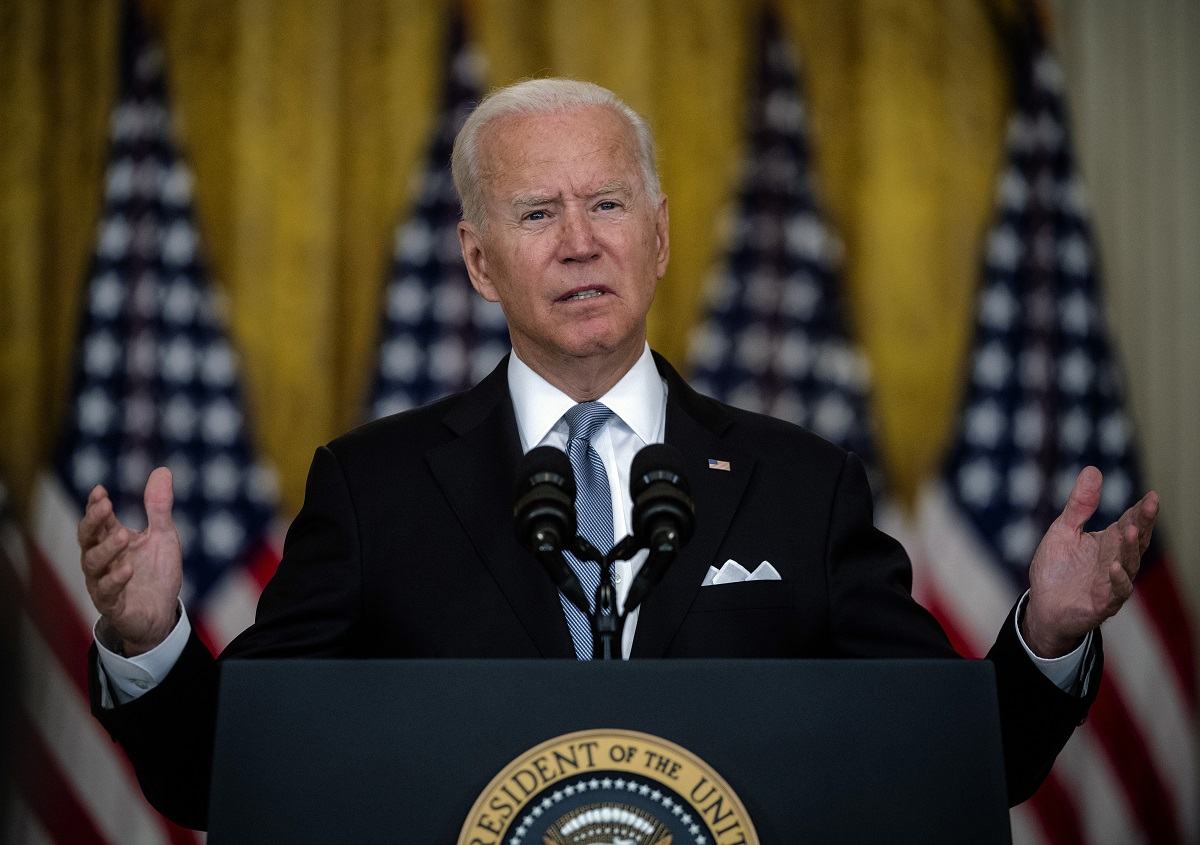
President Biden speaks from the White House on Aug. 16, 2021, as chaos gripped Kabul.
16:54 JST, May 21, 2024
The top U.S. general in Afghanistan during the American military’s 2021 withdrawal repeatedly warned Washington that security would get “very bad, very fast” after troops departed, but the Biden administration still failed to grasp the danger in keeping its embassy open with only nominal protection, he told lawmakers investigating the war’s deadly endgame.
Retired Gen. Austin Scott Miller said in closed-door testimony last month before the Republican-led House Foreign Affairs Committee that, as his tour was nearing its end in July 2021, he was so troubled by the administration’s “lack of understanding of the risk” that he privately warned a Marine Corps commander charged with planning for a possible evacuation to prepare for “really adverse conditions.”
“I did not foresee a good future for Afghanistan as I was departing,” the general said in his testimony, later adding that he wishes he had done more to ensure his perspective from Kabul was consistently represented as plans took shape in Washington.
The transcript of Miller’s interview, obtained by The Washington Post, provides Biden’s critics fresh political ammunition ahead of the November election as they seek to discredit his foreign policy with the scenes of chaos and despair in Kabul when the Taliban stormed back to power.
Miller, who has shunned the spotlight in Washington since relinquishing command in Afghanistan in July 2021, is among about 20 witnesses to meet with the committee to date. Its chairman, Rep. Michael McCaul (R-Tex.), is expected to issue a report this summer detailing the investigation’s findings.
Reached by phone, Miller said he had nothing to add to his testimony.
One person familiar with his thinking said that the general met with the committee voluntarily believing he would be subpoenaed if he declined, and that he wanted lawmakers to understand the advice he provided and the challenges he faced as he carried out orders to wind down the nation’s longest war. This person, like some others contacted for this article, spoke on the condition of anonymity to discuss a subject that remains highly sensitive.
Another person said the general was “not enthusiastic” about testifying because he doesn’t want to be used to wage political attacks on any administration.
McCaul said in a statement that Miller’s testimony reveals how the Biden administration’s “hasty Go-to-Zero order” expedited Afghanistan’s fall and the violent tragedy that marred the Pentagon’s race to evacuate as many people as possible.
The administration and its allies on Capitol Hill have criticized McCaul’s investigation, alleging it has glossed over pivotal decisions made by Biden’s predecessor, Donald Trump, including a deal with the Taliban that set a May 2021 deadline for the full military withdrawal but imposed few conditions and left Biden boxed in with no plan to conduct it.
An official with the White House National Security Council defended Biden’s decision-making, saying that ending the war was “the right thing to do” and allowed the United States to focus on other challenges, such as the war in Ukraine that erupted six months later. Biden, the NSC official said, “refused to send another generation of Americans to fight a war that should have ended long ago.”
A U.S. official, addressing Miller’s criticisms, said that as security deteriorated in Kabul, the State Department “pivoted and worked shoulder to shoulder with our military and other government colleagues to conduct the largest airlift in history.”
But while the United States extracted nearly 124,000 people from a single airfield in the Afghan capital, the success of that mission came at enormous cost.
Biden declared an evacuation Aug. 14, one day before the Afghan government collapsed and its leaders fled the country. The panic drove massive crowds to Kabul’s airport, which was overrun by people desperate to escape the incoming authoritarian regime. Crucially, the Afghan security forces trained, supported and financed by the United States over 20 years wilted and dissolved.
A U.S.-led crisis-response force was flown in to restore order, but two weeks of misery followed. A suicide bombing killed 13 American troops and an estimated 170 Afghans. Days later, a botched U.S. drone strike claimed 10 members of an Afghan family, including seven children.
Tens of thousands of Afghans who had worked for the U.S. and Afghan governments were left behind.
Miller, whose command assignment began in September 2018, told lawmakers he saw Afghanistan “as being on fire” as early as March 2020, shortly after the Trump administration agreed to remove all U.S. troops by May 2021. As 2021 progressed and the American military presence steadily shrank, he said, he grew “scared” for his personnel positioned far from Kabul in southern Helmand province.
No U.S. troops were killed in combat after the deal with the Taliban was signed, but Miller characterized the agreement as “a tough one for the Afghans to absorb.” The militants demanded the release of 5,000 prisoners and regularly attacked Afghan forces. He said he worried they would turn their guns on Americans, too, after the May 1 deadline passed. The Biden administration deliberated on its own plan until April, and then said it would have all forces out by September.
Under questioning by Democrats, Miller also highlighted the mission’s challenges while Trump was commander in chief.
In 2018, Miller recalled, he was awakened in the night by a phone call informing him the military had been directed to prepare “to leave in the middle of the night.” Miller said he responded that this was “not feasible.”
“It wasn’t disobeying an order,” Miller said in his testimony. “I just said, ‘I can’t do it. It’s too hard to do.’”
Miller said he heard rumors of other withdrawal orders in 2020, but those were “walked back or rescinded.”
When he arrived in Afghanistan, Miller took command of about 15,000 U.S. troops and assessed following a review that he could reduce the number to about 8,600. He significantly boosted airstrikes against the Taliban, he said, to pressure the militants to negotiate.
The Trump administration signed the deal with the Taliban in February 2020, even though senior Afghan officials were excluded from the discussion, Miller noted. Later in the year, Trump ordered additional reductions, first to 4,500 U.S. troops and then to 2,500 days before he departed office.
Miller told the committee he thought a force of 2,500 could be sufficient for an undefined period – but with the caveat that a “surge” of additional troops “down the road” might be necessary. Under questioning from Rep. Jason Crow (D-Colo.), a former Army Ranger who served in Afghanistan, Miller said the security situation was in a “slow bleed” at that point.
Biden has vigorously defended his decision to end the mission in Afghanistan and, in an ABC News interview amid the evacuation, claimed that “no one” among his senior military advisers said to him that the United States should retain a force of 2,500 there. Senior defense officials later contradicted him, telling Congress after the operation that they had recommended a couple thousand personnel stay.
In his testimony, Miller described an unusual amount of interaction, for a field commander, with members of Trump’s Cabinet, including Secretary of State Mike Pompeo, whose involvement he called “extensive” and “helpful.”
When the Biden administration took over, it brought a more conventional way of doing business. Miller said he did not hear directly from Secretary of State Antony Blinken, acknowledging that the secretary was not obligated to reach out to the general and that there may have been “sensitivities” within the Defense Department if he had.
Miller said he did consult with Defense Secretary Lloyd Austin; Gen. Mark A. Milley, then the chairman of the Joint Chiefs of Staff; and Gen. Kenneth “Frank” McKenzie, who took over as head of U.S. Central Command in 2019. Other State Department officials also made trips to Kabul and met with him as the administration assessed its options, he said.
Miller, asked about his involvement in the Biden administration’s planning, said he routinely sent McKenzie his assessments and “wasn’t shy” about sharing his opinion. But he added he “wasn’t clamoring” to be in additional meetings. He told lawmakers that, in hindsight, he wishes he had been more directly involved in the deliberations.
James Adams, a Pentagon spokesman, said Austin and Milley, as Biden’s top military advisers, attended those planning sessions. Jake Sullivan, the White House national security adviser, sought out Miller for information separately, said another official familiar with the process.
Miller said the plan in early 2021 had him leaving with the last U.S. forces from Bagram air base, a major installation north of Kabul. But as the crisis grew and the Biden administration sought to continue evacuating U.S. citizens and at-risk Afghans, the plan changed. Bagram was vacated in early July, and a force of about 700 troops was kept in Kabul split between the airport and the embassy.
Brian McKeon, a former deputy secretary of state who oversaw aspects of the withdrawal, said in an interview with The Post that the State Department has maintained embassies in several other dangerous countries. Diplomatic officials, he said, believed that keeping the facility open would help facilitate the departure of more people.
Miller, like other senior military officers involved, told the committee he thought the Biden administration should have declared a U.S. evacuation sooner but that “I understand the quandary.”
“If you start pulling people out,” he asked, “do you precipitate the crisis?”
Top Articles in News Services
-

Survey Shows False Election Info Perceived as True
-

Hong Kong Ex-Publisher Jimmy Lai’s Sentence Raises International Outcry as China Defends It
-

Japan’s Nikkei Stock Average Touches 58,000 as Yen, Jgbs Rally on Election Fallout (UPDATE 1)
-

Japan’s Nikkei Stock Average Falls as US-Iran Tensions Unsettle Investors (UPDATE 1)
-

Trump Names Former Federal Reserve Governor Warsh as the Next Fed Chair, Replacing Powell
JN ACCESS RANKING
-

Producer Behind Pop Group XG Arrested for Cocaine Possession
-

Japan PM Takaichi’s Cabinet Resigns en Masse
-

Man Infected with Measles Reportedly Dined at Restaurant in Tokyo Station
-

Israeli Ambassador to Japan Speaks about Japan’s Role in the Reconstruction of Gaza
-

Videos Plagiarized, Reposted with False Subtitles Claiming ‘Ryukyu Belongs to China’; Anti-China False Information Also Posted in Japan


























